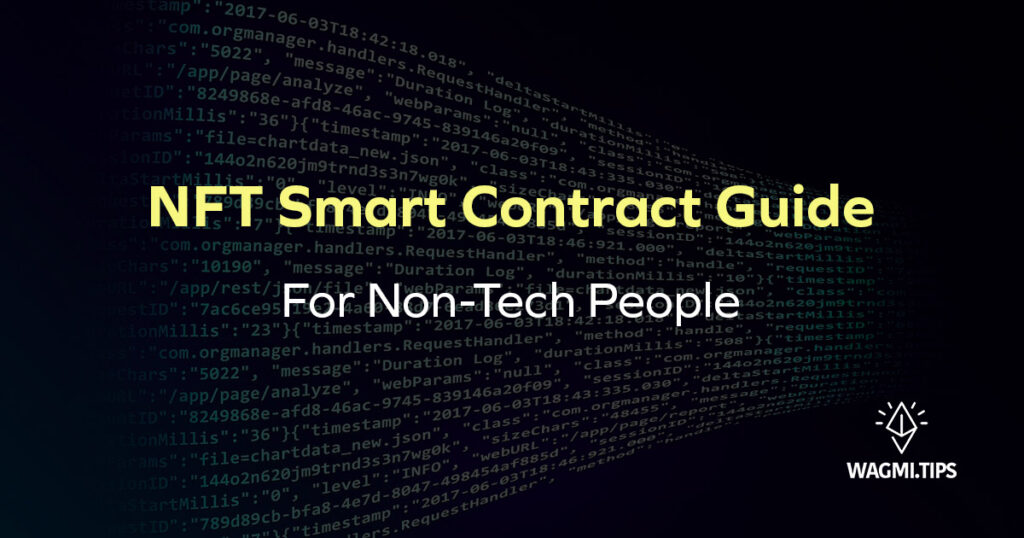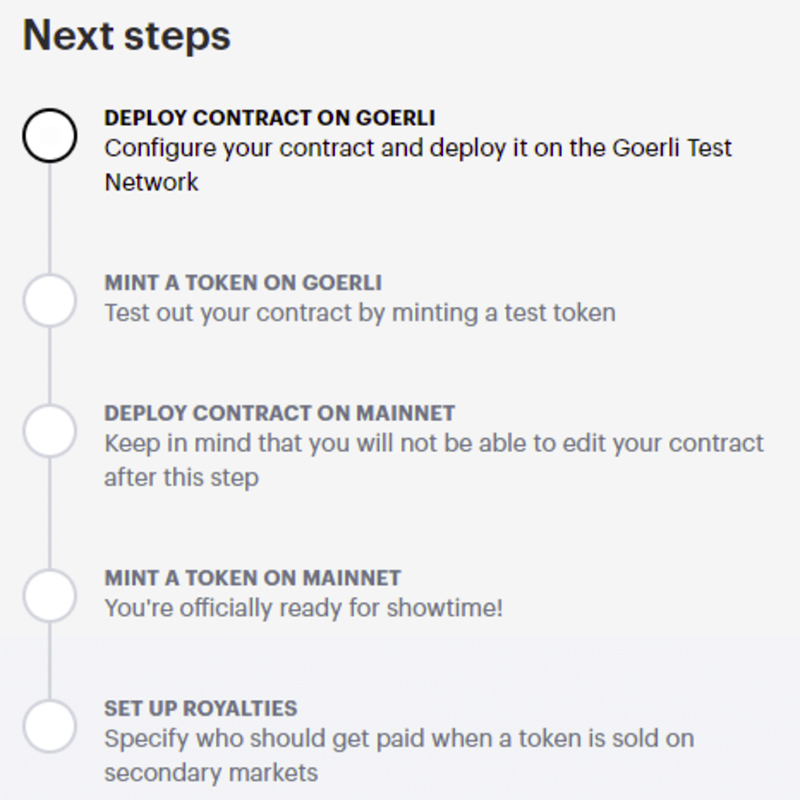NFT Smart Contract Guide For Non-Tech People
If you have been in the NFT space for some time, you have surely come across the term ‘smart contract’. So, what’s all the fuss about smart contracts and is it really that important? This article tells you all you need to know about this fundamental blockchain component, especially if you consider yourself a non-tech person.

Table of Contents
What Is An NFT Smart Contract?
Smart contracts are basically programs stored on a blockchain that automatically run when predetermined conditions are met. Participants of the agreement can be certain that these programs will be executed given that it does not rely on any intermediaries. They can include anything from sending notifications to registrations to releasing payments.
Given that NFTs are developed on blockchains, their functions rely on the underlying smart contracts. NFT smart contracts typically govern the sale agreement between the NFT owner and the buyer, including verifying ownership, executing the ownership transfer, royalty payments, and other relevant events.
While creating a smart contract from scratch can be a complex endeavour, more and more entities are releasing templates and other online tools to simplify this process.

Should You Create Your Own NFT Smart Contract?
With the myriad of NFT marketplaces available today, you can actually choose to take the easy way out. The likes of OpenSea, Rarible, Magic Eden, and others have made listing NFTs pretty simple, almost like any other web2 e-commerce platform. Nevertheless, creating your own NFT smart contract does have its inherent benefits.
The primary reason for developing customised NFT smart contracts is that you make the rules. Many NFT projects in the past have implemented creative economics which really made their brand stand out.
For instance, the Azuki team needed to have their own smart contract to release the Bobu fractionalized NFT since the existing infrastructure in NFT marketplaces are unable to accommodate this process. Furthermore, you have the flexibility to add extra features into your project such as post-mint reveal, holder snapshots, and many more.
Secondly, creating your own smart contracts ensures that the NFTs maintain their functionalities. Minting on a particular NFT marketplace may affect how your project displays in another marketplace. There is also a risk that the creator may not receive royalties in the way it was meant to once it leaves the original site.
Most importantly, if you plan to launch an NFT project and sell your NFTs via a minting website, you will likely need a smart contract built for that purpose. Otherwise, you’ll have to list each NFT one-by-one and require your investors to buy off the NFT marketplace. Not the best experience indeed.
How To Create Your Own NFT Smart Contract?
For those of you that have no technical background, it is not the end of the road. Here are some methods that you can use to develop your own NFT smart contracts.
1) No-code tools
Several no code tools have already surfaced on the market, one of which is Manifold.xyz. This platform strikes a good balance by giving creators high level control over their smart contracts, while ensuring that non-tech creators are able to execute the entire process smoothly. Ultimately, it enables creators to retain true ownership and provenance over their work.
Manifold Studio guides creators through a step by step NFT minting process. Creators start by naming the NFT and selecting between an ERC721 or an ERC1155 token standard. They can then test out their NFT smart contract on the Goerli testnet before deploying on the mainnet. This significantly reduces the risks as minting on the testnet only costs around 0.005 ETH, depending on the network traffic at the time. The contracts will be permanent after it is deployed on the mainnet, and creators can then proceed to minting their NFTs.

Besides Manifold, NiftyKit and Zero Code NFT offer more advanced features for your upcoming NFT collection. NiftyKit has different packages to cater for different creators, with prices ranging from 0.15 ETH for the Basic Creator Pass up to 7.5 ETH for the Pro Creator Pass.
Besides being able to choose from ERC721 and ERC721a, you can also embed a mint button on your website, or implement revenue split and token gating into your NFT smart contracts.
Manifold Tutorial: https://docs.manifold.xyz/v/manifold-studio
NiftyKit Tutorial: https://docs.niftykit.com/get-started/introduction
2) Refer to existing NFT projects
The transparent and open-source nature of blockchain technology allows creators to use existing NFT projects as a reference as they continue to innovate. Today, we can interact with any smart contracts verified on Etherscan using its read and write features. We can study the code and find out various information about the project. For instance, we can see how many NFTs a particular address owns, the total supply in a collection, the starting price of the auction, and many others.
You can check out the Azuki Token Tracker here and read the code. Fun fact: The Azuki smart contract has become the gold standard for many modern NFT project smart contracts as the code has been optimized to save gas fees.
3) Hire a Blockchain Developer
You can hire many reputable blockchain or NFT smart contract developers on freelancer marketplaces like Upwork. There are many freelancers with difference rates available, so it is important for you to choose someone who is within your budget but also has a good reputation and track record of developing smart contracts. This is important to ensure the safety and security of your smart contract as there have been cases where these contracts have been exploited by bad hats.
Summary
No code tools are more than enough for your brand to introduce cool NFT collections to your community. However, they can only go so far given that the features being offered are mostly common features in the NFT space. If you want to differentiate your NFT collection from the existing projects, you will eventually require the necessary technical expertise to develop new features.
We hope this guide has served as a good introduction to NFT smart contracts and will help you on your next NFT project.
